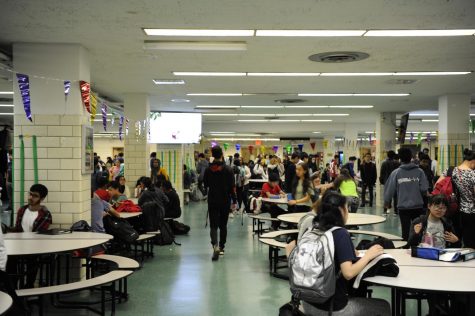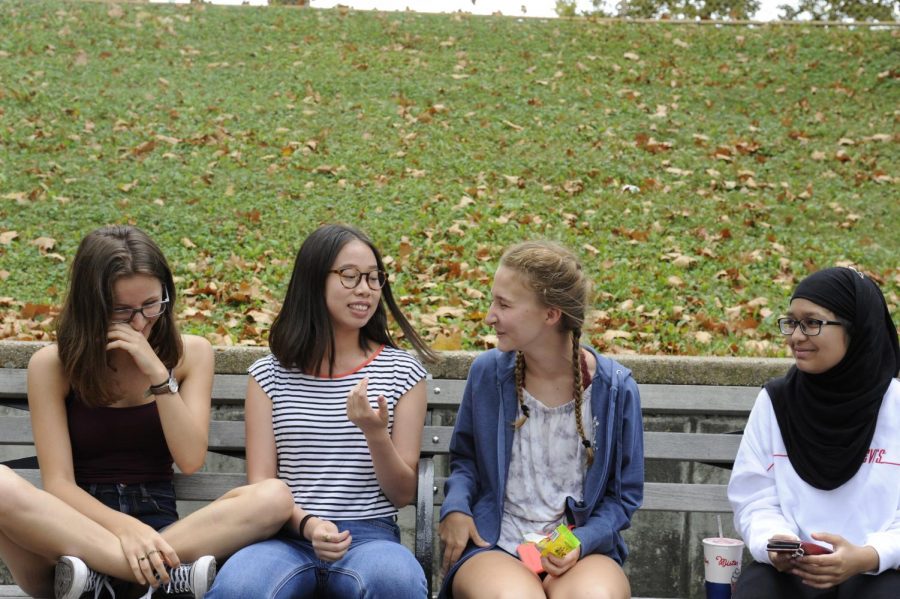The Most Important Meal of the Day
Students take a break from the books, enjoying the weather outside to eat and socialize.
With only nine periods in a day, many Bronx Science students have trouble fitting all of the classes they want to take throughout the year into their schedules. As most classes are daily and every science class has at least two double-period lessons per week, creating a schedule that consists of all a student’s desired classes is often difficult.
Students respond by dropping lunch, giving up that one, vital period of the day when they can rest their brains and power up with fuel. Although teachers are accommodating to students without a lunch period, allowing them to eat during class time, another detriment of dropping lunch is that students have no breaks to socialize during the school day, something that is very important among developing adolescents. In a school as large as Bronx Science, it can be difficult to stay in touch with friends, especially if you do not share any classes.

Students flock to the popular food trucks to buy lunch during their lunch period.
Additionally, having a lunch can serve as a free period to get work done, to meet with a teacher, or to study for a test. Mr. Cogliano, the school’s resident social worker, believes that students need a break and time to see friends during the day. He said, “Students need to eat something, to de-stress, and to clear their minds.” He has had students who have regretted dropping lunch, and believes that students should only drop lunch in order to take classes that they are truly interested in.
“Students need to eat something, to de-stress, and to clear their minds.”
Although all students even without a lunch period have the option of eating lunch during class time, not all students choose to eat lunch. For whatever reason students choose not to each lunch, it is an unhealthy choice. Skipping meals has been shown to be linked to increased risk of diabetes, weight gain, binge eating, fatigue, and impaired concentration, according to an article on LiveStrong.com entitled “What Effect Does Skipping Meals Have on the Body?” by Carly Schuna. Skipping lunch is also detrimental to academic performance. According to Diane Pratt-Heavner, a spokeswoman for the School Nutrition Association, “Students who don’t sit down to eat a healthy midday meal will not have the attention span and level of detail they need to succeed in school.”
In students’ efforts to be academically stronger in taking extra classes, they are actually harming their performance in school.
Of course, we cannot blame Bronx Science students for dropping lunch. While it is a choice, many students feel inclined to drop lunch, as they think they need their extra courses in their course load. With the competitive and rigorous environment at Bronx Science, students will take any opportunity to increase their qualifications for college acceptance. Amanda Chen ’19 believes that dropping lunch should not be an option. She noted, “I have always had lunch, and I’m glad about that. I know people who don’t. I think they don’t do as well in school because of that. Having a lunch period helps me to relax in the middle of the day.”
Mr. Cogliano sees dropping lunch as a privilege, and not a right. He believes there should be more requirements to drop lunch, and that students have to demonstrate the ability to handle their rigorous schedules which still making the time to eat lunch during class time. Students should listen to their guidance counselors if their counselor feels dropping lunch will not be right for the student.

The cafeteria, the center of lunchtime, is full of students eating, socializing, and catching up on school work.
The solution is clear: take away the option of dropping lunch. This way, students will be mandated in a way to take a break and eat. Students will not feel compelled to drop lunch in thinking they need to take advantage of the opportunity to enroll in more classes. The issue with taking away this option is that it will be more difficult to fulfill certain requirements, such as art or health.
For now, we can only steer students away from dropping lunch, but hopefully, in the future, lunch will be a requirement and there will be other ways to fulfill academic requirements.
Abigail Aronson is a Staff Reporter for the ‘Science Survey’ and the Sidebar and Captions Editor for the ‘Observatory’. She enjoys journalistic...
Gazi Fuad is a Chief Photographer & Photo Editor for the school yearbook ‘The Observatory.’ Outside of school, he is part of a team of photographers....
Jackson Trauben is a Photo Editor and Chief Photographer for ‘The Observatory.’ An avid reader and artist, Jackson loves using photography as a lens...

